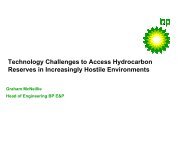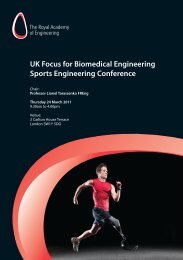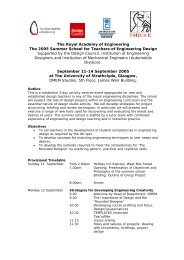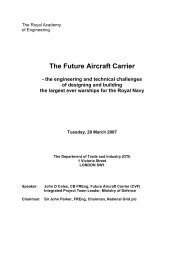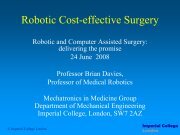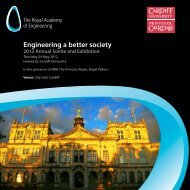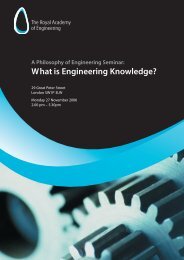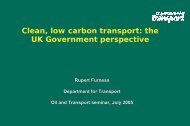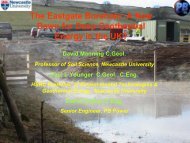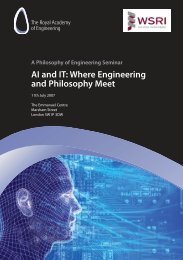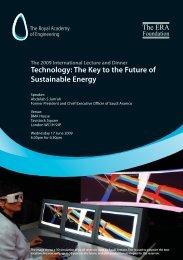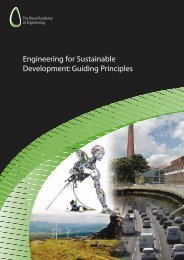Engineering Ethics: Do engineers owe duties to the
Engineering Ethics: Do engineers owe duties to the
Engineering Ethics: Do engineers owe duties to the
Create successful ePaper yourself
Turn your PDF publications into a flip-book with our unique Google optimized e-Paper software.
The Lloyd’s Register Lecture<br />
Privilege applies "Where a person is so situated that it becomes right in <strong>the</strong> interest of society that he should tell <strong>to</strong><br />
a third person certain facts". 55 The practical question is whe<strong>the</strong>r a claim of privilege was sufficiently<br />
compelling <strong>to</strong> dissuade <strong>the</strong> court from restraining <strong>the</strong> disclosure by injunction. 56 Where <strong>the</strong> injunction is<br />
refused <strong>the</strong> Engineer would still face <strong>the</strong> burden of establishing <strong>the</strong> defence at trial, with <strong>the</strong> consequence<br />
of heavy costs, unless <strong>the</strong> defence was so meri<strong>to</strong>rious as <strong>to</strong> justify summary dismissal of <strong>the</strong> claim. 57 It<br />
should be added that English law of defamation pays more regard <strong>to</strong> <strong>the</strong> rights of <strong>the</strong> person defamed<br />
than in o<strong>the</strong>r jurisdictions. In <strong>the</strong> USA, normally in <strong>the</strong> vanguard of more extreme classes of civil action,<br />
public interest in disclosure is afforded much more weight, such that it is claimed that <strong>the</strong> gagging<br />
procedures of Robert Maxwell would not be possible.<br />
Consequences of unauthorised disclosure<br />
If an Engineer takes it upon himself <strong>to</strong> deliver a warning <strong>to</strong> <strong>the</strong> public in relation <strong>to</strong> issues of safety or<br />
environment he exposes himself <strong>to</strong> personal risks beyond <strong>the</strong> threat of legal proceedings. It is <strong>the</strong> actions<br />
by Engineers in such circumstances which have given rise <strong>to</strong> major activity in <strong>the</strong> field of <strong>Engineering</strong><br />
<strong>Ethics</strong> in <strong>the</strong> USA. There are many reported cases of Engineers acting in a responsible manner, assuming<br />
<strong>the</strong> existence of a duty <strong>to</strong> warn members of <strong>the</strong> public, and of suffering personal hardship in<br />
consequence, frequently through being victimised as "whistlebl<strong>owe</strong>rs". While extensive state and federal<br />
legislation exists in <strong>the</strong> USA, 58 publications on ethical issues report numerous cases of hardship following<br />
loss of employment and o<strong>the</strong>r forms of victimisation. It is abundantly clear from <strong>the</strong> American experience<br />
that Engineers acting in pursuit of a supposed public duty are not necessarily perceived as heroes and<br />
<strong>the</strong>re seem few instances of appropriate recognition being accorded <strong>to</strong> <strong>the</strong>m. 59<br />
In England relief is now available in such circumstances through <strong>the</strong> Public Interest Disclosure Act 1998. 60<br />
The Act prohibits dismissal in relation <strong>to</strong> certain disclosures defined as "qualifying disclosures". These<br />
include information which, in <strong>the</strong> reasonable belief of <strong>the</strong> employee, tends <strong>to</strong> show one or more of <strong>the</strong><br />
following:<br />
(a) that criminal offence is being committed;<br />
(b) that a person is failing <strong>to</strong> comply with a legal obligation;<br />
(c) that a miscarriage of justice is occurring;<br />
(d) that <strong>the</strong> health or safety of an individual is being endangered;<br />
(e) that <strong>the</strong> environment is being damaged;<br />
(f) that information is being concealed.<br />
A qualifying disclosure is a "protected disclosure" when made in accordance with <strong>the</strong> procedure under <strong>the</strong><br />
Act. In most cases <strong>the</strong> employee is obliged <strong>to</strong> go first <strong>to</strong> his employer but in some circumstances may go<br />
over his head. These include where <strong>the</strong> worker reasonably believes he will suffer a detriment if he goes <strong>to</strong><br />
<strong>the</strong> employer or that evidence will be concealed. Going direct <strong>to</strong> <strong>the</strong> public might also be justified where<br />
<strong>the</strong> matter is of an exceptionally serious nature. Where a disclosure is protected <strong>the</strong> employer is<br />
prohibited from subjecting <strong>the</strong> employee <strong>to</strong> detriment, dismissing him or making him redundant on <strong>the</strong><br />
grounds of <strong>the</strong> disclosure. The Act follows experience in <strong>the</strong> USA which, as noted above, has not been<br />
55 Per Blackburn J in Davies v Snead [1870] LR 5 QB 608 at 611.<br />
56 See Clerk and Lindsell 22-124<br />
57 Defamation Act 1996 s.8; and see also Loutchansky v The Times [2002] 2 WLR 640; Branson v B<strong>owe</strong>r [2002] 2 WLR 452.<br />
58 Whistlebl<strong>owe</strong>r protection on <strong>the</strong> federal level in <strong>the</strong> U.S. is scattered throughout various statutes, including <strong>the</strong><br />
environmental laws (such as Superfund, 42 U.S.C. 9610, <strong>the</strong> Water Pollution Control<br />
Act, 33 U.S.C. 1367, and <strong>the</strong> A<strong>to</strong>mic Energy and Energy Reorganization Acts, 42 U.S.C. 5851), <strong>the</strong> employment laws (such<br />
as <strong>the</strong> Occupational Safety and Health Act, 29 U.S.C. 660(c), <strong>the</strong> Federal Mine Health and Safety Act, 30 U.S.C. 30 U.S.C.<br />
815 (c) (1977) and <strong>the</strong> National Labor Relations Act, 29 U.S.C. 158(a)(4)), and in a number of o<strong>the</strong>r subject areas.<br />
59 See, e.g., Rachel Davis, ‘For Whistlebl<strong>owe</strong>rs, Ethical Mile is a Hard Walk’ (Mar. 2001) at <strong>the</strong> NSPE<br />
website at http://nspe.org/etweb/13-01feature.asp and Walter Elden, ‘Curtailing Ethical Harassment (Feb. 1996) at <strong>the</strong> IEEE<br />
website at http://caffeine.ieee.org/INST/feb96/ethics.html.<br />
60 By insertion of a new Part IV A of <strong>the</strong> Employment Rights Act 1996.<br />
16 The Royal Academy of <strong>Engineering</strong>



